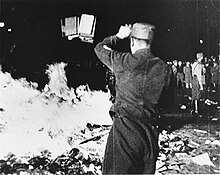
Back حرق الكتب Arabic Изгаряне на книги Bulgarian Crema de llibres Catalan Bogbrænding Danish Bücherverbrennung German Bruligo de libroj Esperanto Quema de libros Spanish Liburuen erreketa Basque کتابسوزی Persian Kirjarovio Finnish



Book burning is the deliberate destruction by fire of books or other written materials, usually carried out in a public context. The burning of books represents an element of censorship and usually proceeds from a cultural, religious, or political opposition to the materials in question.[1] Book burning can be an act of contempt for the book's contents or author, intended to draw wider public attention to this opposition, or conceal the information contained in the text from being made public, such as diaries or ledgers. Burning and other methods of destruction are together known as biblioclasm or libricide.
In some cases, the destroyed works are irreplaceable and their burning constitutes a severe loss to cultural heritage. Examples include the burning of books and burying of scholars under China's Qin dynasty (213–210 BCE), the destruction of the House of Wisdom during the Mongol siege of Baghdad (1258), the destruction of Aztec codices by Itzcoatl (1430s), the burning of Maya codices on the order of bishop Diego de Landa (1562),[2] and the burning of Jaffna Public Library in Sri Lanka (1981).[3]
In other cases, such as the Nazi book burnings, copies of the destroyed books survive, but the instance of book burning becomes emblematic of a harsh and oppressive regime which is seeking to censor or silence some aspect of prevailing culture.
In modern times, other forms of media, such as phonograph records, video tapes, and CDs have also been burned, shredded, or crushed. Art destruction is related to book burning, both because it might have similar cultural, religious, or political connotations, and because in various historical cases, books and artworks were destroyed at the same time.
When the burning is widespread and systematic, destruction of books and media can become a significant component of cultural genocide.
- ^ a b "Book Burning". United States Holocaust Memorial Museum. Archived from the original on 5 March 2012. Retrieved 8 November 2022.
- ^ Brockell, Gillian. "Burning books: 6 outrageous, tragic and weird examples in history". The Washington Post. Archived from the original on 13 November 2021. Retrieved 8 November 2022.
- ^ Cite error: The named reference
smithsonianwas invoked but never defined (see the help page).
© MMXXIII Rich X Search. We shall prevail. All rights reserved. Rich X Search